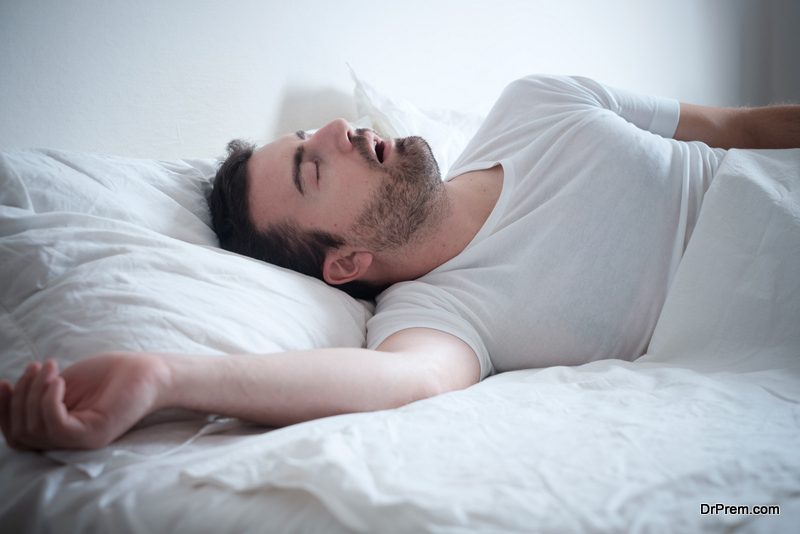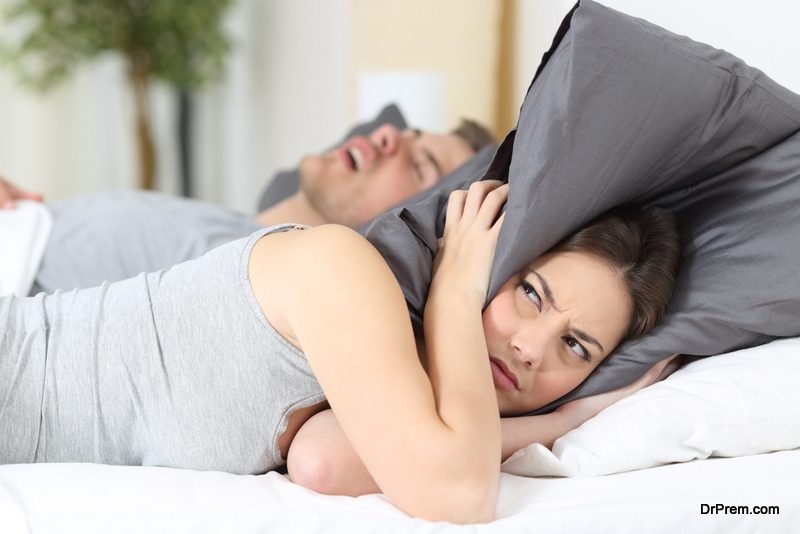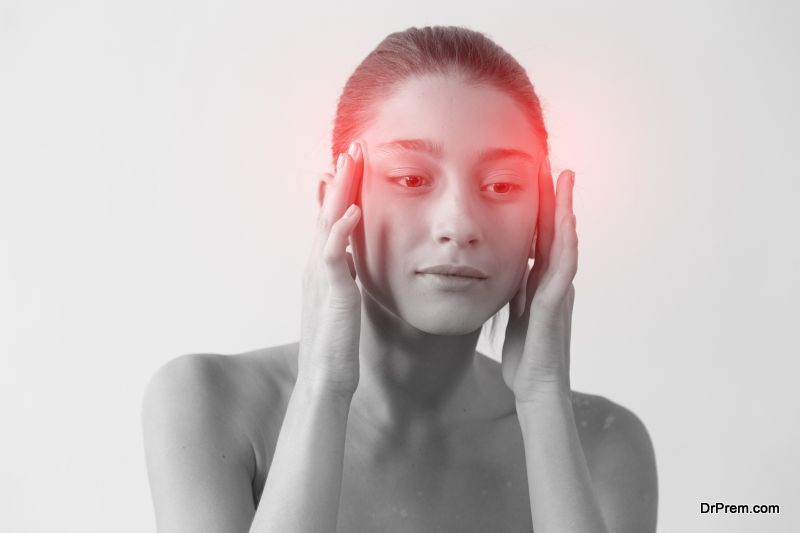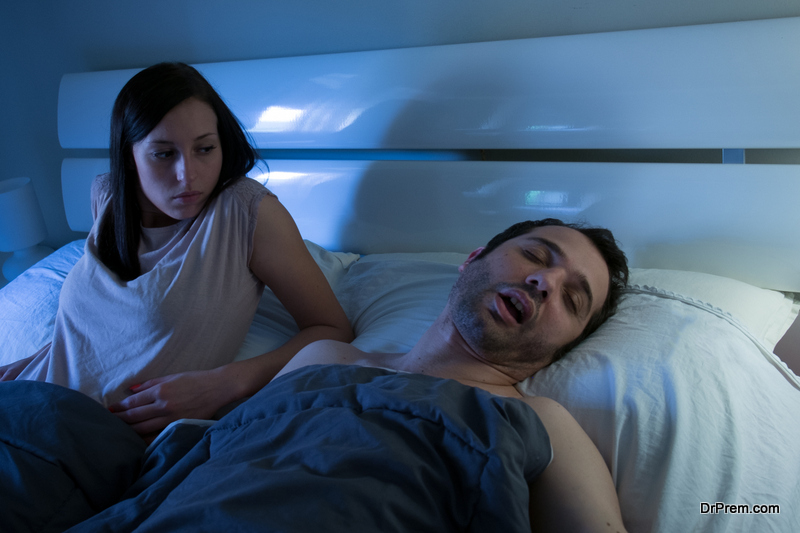Do you snore? Are you tired all the time? Think it’s no big deal? Think again. These are all signs that you may be suffering from sleep apnea, which is a very serious sleep disorder. Sleep apnea sufferers experience interrupted breathing throughout the night, causing the heart, lungs, and brain to overexert themselves in an effort to breathe and keep you alive! While snoring is a common, light-hearted tiff among partners, sleep apnea is no laughing matter. If this sounds like you, a sleep apnea test may be in order. Still not sure? Here are 5 signs that you may have sleep apnea.
1. Pausing Between Breaths
 Pausing between breaths or a complete stop in your breathing during sleep is a tell-tale sign that you have sleep apnea. In fact, interrupted breathing during sleep is the definition of sleep apnea. What makes this symptom a little tricky to identify is the fact that your partner, spouse, or roommate will most likely notice before you do. During sleep, the fatty tissues in your tongue and throat relax and fall back into your airway. This restricts your breathing, causing you to stop or gasp for air. Although you’re sleeping, your brain recognizes that you’re in distress, causing you to partially awake in an effort to clear the blockage and get oxygen to your lungs, brain, and the rest of your body.
Pausing between breaths or a complete stop in your breathing during sleep is a tell-tale sign that you have sleep apnea. In fact, interrupted breathing during sleep is the definition of sleep apnea. What makes this symptom a little tricky to identify is the fact that your partner, spouse, or roommate will most likely notice before you do. During sleep, the fatty tissues in your tongue and throat relax and fall back into your airway. This restricts your breathing, causing you to stop or gasp for air. Although you’re sleeping, your brain recognizes that you’re in distress, causing you to partially awake in an effort to clear the blockage and get oxygen to your lungs, brain, and the rest of your body.
2. Snoring
This is one of the main, and most obvious, signs that you may have sleep apnea. Snoring is a result of a blockage or obstruction causing vibrations in your upper respiratory airways. These blockages prevent air from passing easily through your airways. Although snoring is not a direct indicator of sleep apnea, it is one of the most common signs that your body isn’t receiving adequate oxygen. If your snoring is loud, disruptive to both yourself and your partner, or wakes you during the night, you may have sleep apnea and should consult your doctor.
3. Exhaustion
 It’s no wonder sleep apnea patients are tired all the time. You’re not really sleeping! Every time you stop breathing, snore yourself awake, or gasp for your air, you’re disrupting your sleep. Sleep apnea sufferers often think they’re sleeping when in actuality; their body never enters a deep sleep due to breathing disturbances. But how do you decipher between normal daytime fatigue and exhaustion due to sleep apnea? Some signs include difficulty waking in the morning, the need for frequent naps, difficulty concentrating, and falling asleep in public places or at inappropriate times. Lack of sleep may also cause mood swings and irritability. If you’re feeling agitated or overly moody during the day, you may not be sleeping as soundly as you think. These are all signs that you may have sleep apnea.
It’s no wonder sleep apnea patients are tired all the time. You’re not really sleeping! Every time you stop breathing, snore yourself awake, or gasp for your air, you’re disrupting your sleep. Sleep apnea sufferers often think they’re sleeping when in actuality; their body never enters a deep sleep due to breathing disturbances. But how do you decipher between normal daytime fatigue and exhaustion due to sleep apnea? Some signs include difficulty waking in the morning, the need for frequent naps, difficulty concentrating, and falling asleep in public places or at inappropriate times. Lack of sleep may also cause mood swings and irritability. If you’re feeling agitated or overly moody during the day, you may not be sleeping as soundly as you think. These are all signs that you may have sleep apnea.
4. Overweight or Obese
Being overweight can actually cause sleep apnea. That’s because the fatty tissues that obstruct the throat and airways are more prevalent in those of an unhealthy weight. When an overweight individual lays down, they are more likely to experience breaks or interruptions in breathing. Increased pressure is placed on the chest and neck, narrowing the airways even further. It’s interesting to note that some people with sleep apnea develop a weight issue over time, due to inadequate rest and unhealthy sleep patterns. This creates an unhealthy cycle, making a health weight one of the best defenses against sleep disorders like sleep apnea.
5. Frequent Headaches

Headaches are a common occurrence when your body and brain don’t receive enough oxygen. Low oxygen levels in the blood cause blood vessels to widen. This causes vascular headaches. Lack of sleep due to sleep apnea can trigger headaches, which may occur in the morning or throughout the day. Migraines are another type of headache associated with the sleep disorder. Constant snoring and gasps for breath also put strain on the head, neck, and shoulders, which can result in tension headaches. Not to mention the headache that snoring gives the person sharing your bed.
Conclusion
All too often, symptoms of sleep apnea are mistaken for something else or not taken seriously. If you’re snoring has become disruptive or you’re in a constant state of fatigue and exhaustion, you may have sleep apnea. This sleep disorder can be life threatening, depending on the severity. A simple call to your doctor and an at-home sleep study could help diagnose the condition and put you on the road to recovery.
Article Submitted By Community Writer




